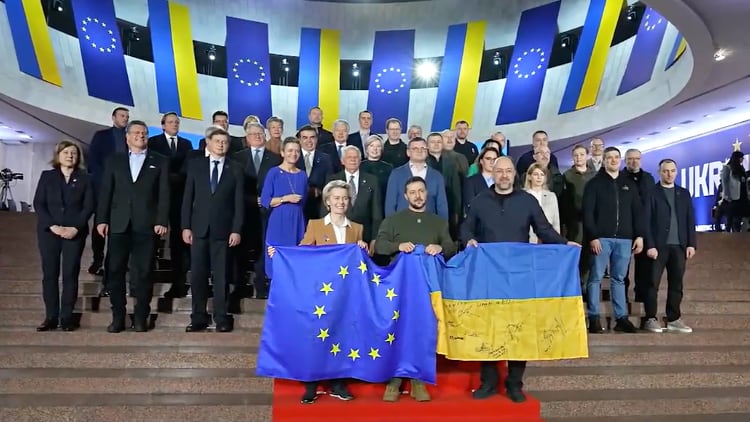The Diplomat
The European Union is preparing the tenth round of sanctions against Russia, which it plans to implement on 24 February, “exactly one year after the beginning of the invasion” of Ukraine, European Commission President Ursula von der Leyen announced yesterday in Kyiv.
She announced the new measures together with Ukrainian President Volodymyr Zelenski during a visit to Ukraine by a delegation of 15 European Commissioners. The aim of the visit, in addition to showing the support of the EU-27, was to begin talks on Ukraine’s accession to the EU.
“We will present with our G7 partners a cap on the price of Russian oil products,” Von der Leyen said, who also announced that the bloc is studying how to use the goods confiscated from Russia in the reconstruction of Ukraine, and announced the creation of a new international centre to gather evidence of war crimes, with a view to bringing those responsible to justice.
The Commission President recalled that the EU warned before the war began of the economic repercussions of the invasion and today Russia, she said, “is paying a heavy price and seeing its economy set back a generation”.
At the same press conference, Zelenski lamented that Europe has “slowed down the speed of sanctions”, while Russia is “accelerating” its adaptation to the measures. “The more we do, the closer we will be to Russia’s defeat,” he said.
Speaking to journalists in Brussels before the trip to Ukraine, the EU’s High Representative for Foreign Policy, Josep Borrell, referred to this new round of sanctions, assuring that the EU is studying the possibility of cutting all of Russia’s technological links with the West, in such a way as to reduce its capacity to exploit natural resources and manufacture weapons.
“We have to look for elements that can be sanctioned, because almost everything has already been done,” said the head of European diplomacy. However, he did not specify whether the tenth round of sanctions could affect Russia’s nuclear sector.







